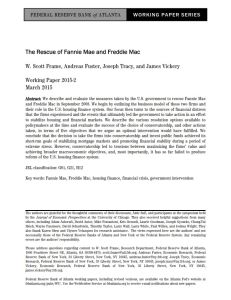Join getAbstract to access the summary!

Join getAbstract to access the summary!
W. Scott Frame, Andreas Fuster, Joseph Tracy and James Vickery
The Rescue of Fannie Mae and Freddie Mac
Federal Reserve Bank of Atlanta, 2015
What's inside?
Fannie Mae and Freddie Mac are healthier in 2015 than they were in 2008, thanks to government intervention, but their problems aren’t over.
Recommendation
The story behind Fannie Mae and Freddie Mac’s rise and fall is a cautionary tale about what can happen when good government intentions have less than satisfying outcomes. The major role these firms played in fueling the 2008 financial crisis became apparent when the US government took them into conservatorship to protect some $5.2 trillion in mortgage debt. By mid-2015, with tighter lending standards, a better housing market and an improving economy, the financial picture for the two agencies looked much brighter than it was in 2008. Still, as this astute report from Federal Reserve Bank of Atlanta says, long-term solutions that would make the mortgage market less vulnerable to shocks remain elusive. Federal Reserve economists W. Scott Frame, Andreas Fuster, Joseph Tracy and James Vickery do an excellent job of explaining the government’s role in saving Fannie Mae and Freddie Mac, while also discussing some of the effort’s tactical shortcomings. getAbstract recommends this report to economists, bankers and anyone seeking new perspectives on past and current risks in the US residential mortgage finance market.
Summary
About the Authors
W. Scott Frame is an economist at the Federal Reserve Bank of Atlanta. Andreas Fuster, Joseph Tracy and James Vickery are economists at the Federal Reserve Bank of New York.






















Comment on this summary